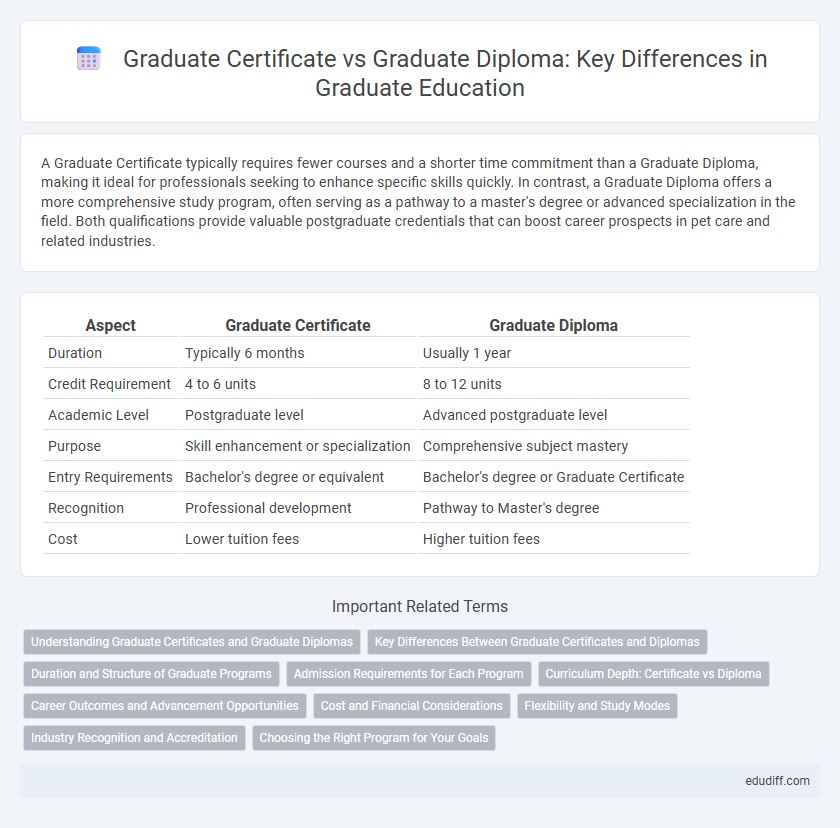A Graduate Certificate typically requires fewer courses and a shorter time commitment than a Graduate Diploma, making it ideal for professionals seeking to enhance specific skills quickly. In contrast, a Graduate Diploma offers a more comprehensive study program, often serving as a pathway to a master's degree or advanced specialization in the field. Both qualifications provide valuable postgraduate credentials that can boost career prospects in pet care and related industries.
Table of Comparison
| Aspect | Graduate Certificate | Graduate Diploma |
|---|---|---|
| Duration | Typically 6 months | Usually 1 year |
| Credit Requirement | 4 to 6 units | 8 to 12 units |
| Academic Level | Postgraduate level | Advanced postgraduate level |
| Purpose | Skill enhancement or specialization | Comprehensive subject mastery |
| Entry Requirements | Bachelor's degree or equivalent | Bachelor's degree or Graduate Certificate |
| Recognition | Professional development | Pathway to Master's degree |
| Cost | Lower tuition fees | Higher tuition fees |
Understanding Graduate Certificates and Graduate Diplomas
Graduate Certificates typically consist of 4 to 6 courses focused on specialized skills that enhance professional expertise, often completed within six months. Graduate Diplomas require a more comprehensive study load, usually spanning 8 to 12 courses and lasting up to one year, providing broader knowledge that bridges undergraduate and postgraduate levels. Both qualifications serve as pathways to further education or career advancement, with Graduate Diplomas offering deeper academic engagement compared to the skill-specific focus of Graduate Certificates.
Key Differences Between Graduate Certificates and Diplomas
Graduate certificates typically require fewer courses than graduate diplomas, focusing on specialized skills or knowledge in a shorter timeframe. Graduate diplomas encompass a broader curriculum and often serve as a bridge to master's degree programs, providing more comprehensive academic training. Both qualifications enhance career prospects, but diplomas offer deeper theoretical understanding alongside practical expertise.
Duration and Structure of Graduate Programs
Graduate Certificate programs typically require 6 to 12 months of study and consist of 4 to 6 courses focused on specialized skills. Graduate Diploma programs usually take 12 to 24 months to complete with 8 to 12 courses, providing a broader and more in-depth curriculum. Both formats offer flexible structures, but diplomas demand a longer commitment and greater academic intensity compared to certificates.
Admission Requirements for Each Program
Graduate Certificate programs typically require a bachelor's degree or equivalent as the minimum admission criterion, often with a focus on relevant academic or professional experience. Graduate Diploma programs demand a higher level of prior academic achievement, usually necessitating a completed undergraduate degree with a specified GPA, reflecting more advanced study. Both programs may require supporting documents such as transcripts, letters of recommendation, and a statement of purpose to demonstrate eligibility and intent.
Curriculum Depth: Certificate vs Diploma
Graduate certificates typically offer focused curriculum in a specialized subject, comprising around four to six courses designed to provide practical skills and foundational knowledge. In contrast, graduate diplomas involve a deeper and broader curriculum, usually requiring completion of eight to twelve courses, including theoretical and applied components that prepare students for professional practice or further study. The increased curriculum depth in graduate diplomas enhances expertise and may fulfill academic prerequisites for master's degree programs.
Career Outcomes and Advancement Opportunities
Graduate Certificates offer targeted skill enhancement that can lead to quicker entry into specialized roles, making them ideal for professionals seeking immediate career advancement or a pivot within their field. Graduate Diplomas provide more comprehensive coursework and deeper knowledge, often unlocking higher-level positions and greater leadership opportunities in competitive industries. Employers typically recognize Graduate Diplomas as a stronger qualification for roles requiring advanced expertise, while Graduate Certificates are valued for their focus on practical, job-ready skills.
Cost and Financial Considerations
Graduate Certificates typically cost less than Graduate Diplomas due to their shorter duration and fewer credit requirements, making them a cost-effective choice for quick skill enhancement. Graduate Diplomas demand a higher financial investment, reflecting their more comprehensive curriculum and greater credit load, often required for professional advancement. Prospective students should evaluate tuition fees, potential scholarships, and the return on investment when deciding between the two.
Flexibility and Study Modes
Graduate Certificates offer greater flexibility with shorter durations, often allowing part-time or online study modes that accommodate working professionals. Graduate Diplomas typically require a longer commitment but provide more in-depth knowledge, available through both on-campus and blended learning formats. Both qualifications support flexible study options, yet Graduate Certificates prioritize accelerated pathways and accessibility for immediate skill enhancement.
Industry Recognition and Accreditation
Graduate Certificates typically offer targeted, industry-specific skills with strong recognition from professional bodies, ideal for quick upskilling and certification in niche fields. Graduate Diplomas provide broader academic training with robust accreditation from universities and professional institutions, often enhancing eligibility for advanced roles or further postgraduate study. Employers value Graduate Diplomas for their comprehensive knowledge base, while Graduate Certificates are preferred for specialized expertise in fast-evolving industries.
Choosing the Right Program for Your Goals
Graduate Certificate programs offer focused, skill-specific training ideal for professionals seeking quick upskilling or career shifts, typically requiring fewer credits than Graduate Diplomas. Graduate Diplomas provide broader, in-depth study and academic rigor, suitable for those aiming to enhance expertise or transition into new fields with comprehensive knowledge. Selecting between the two depends on your career objectives, time commitment, and desired level of specialization.
Graduate Certificate vs Graduate Diploma Infographic

 edudiff.com
edudiff.com